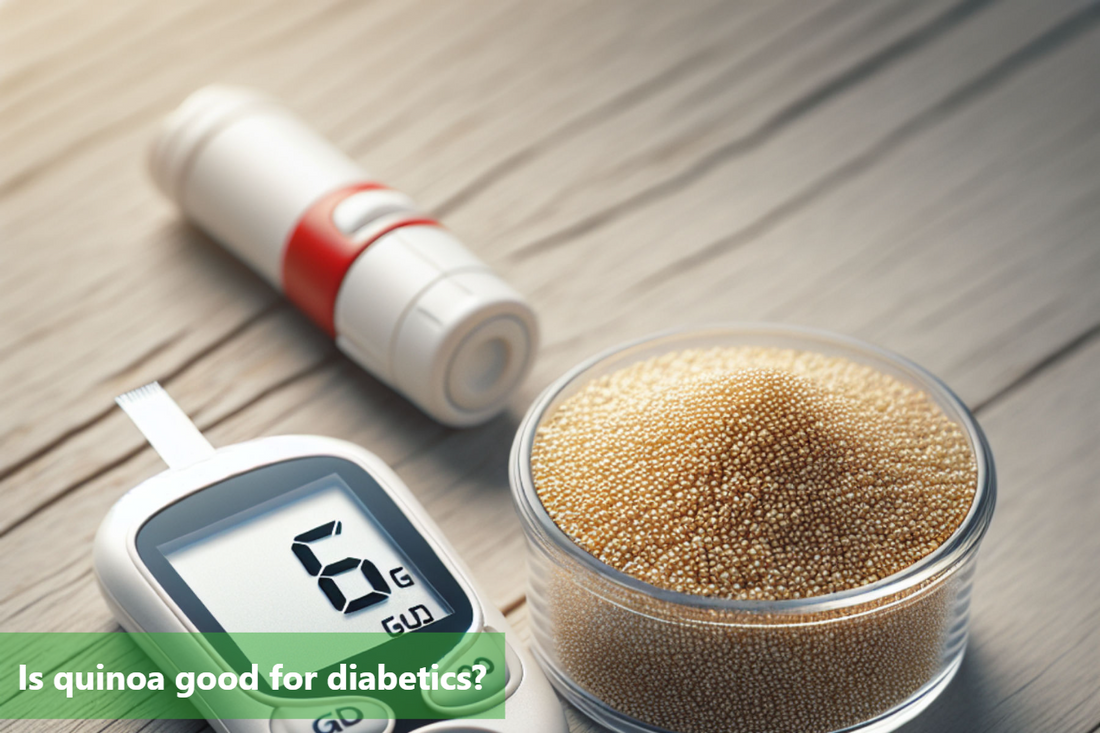Quinoa, a versatile and nutrient-rich grain, has gained popularity in recent years for its exceptional nutritional value. Packed with essential nutrients, quinoa is a great addition to a balanced diet. Now, you might be wondering, is quinoa good for diabetics?
Diabetes is a condition that requires careful consideration of food choices, and quinoa can be a valuable inclusion in a diabetic diet. With a low glycemic index, quinoa is a complex carbohydrate that is digested slowly, leading to a gradual release of energy and helping in blood sugar regulation.
When exploring the relationship between quinoa and diabetes, it is important to highlight the fiber content of quinoa, which aids in digestion and promotes satiety. Additionally, the protein and antioxidants present in quinoa contribute to overall health and well-being.
Nutritional Benefits of Quinoa
Nutrient |
Amount per 1 cup (185g) Cooked Quinoa |
Calories |
222 |
Protein |
8 grams |
Fat |
4 grams |
Carbohydrates |
39 grams |
Fiber |
5 grams |
Sugars |
1 gram |
Calcium |
31 mg |
Iron |
2.8 mg |
Potassium |
318 mg |
Sodium |
13 mg |
Magnesium |
118 mg |
Quinoa is a nutritious whole grain that is high in protein, fiber, and various vitamins and minerals. It's a great option for those looking to add more plant-based protein to their diets.
Quinoa for Diabetics: Benefits and Considerations
1. Low Glycemic Index:
Quinoa has a low glycemic index, which means it doesn't cause spikes in blood sugar levels. This makes it a suitable option for diabetics who need to manage their blood sugar levels.
2. High in Fiber:
Quinoa is rich in dietary fiber, which aids in digestion and helps regulate blood sugar levels. Fiber slows down the absorption of glucose, preventing rapid spikes in blood sugar after meals.
3. Protein Content:
Quinoa is one of the few plant-based sources of complete protein, containing all nine essential amino acids. Protein helps stabilize blood sugar levels and promotes satiety, preventing overeating and weight gain.
4. Nutrient Dense:
Quinoa is packed with essential nutrients such as magnesium, iron, and zinc, which are beneficial for overall health. Magnesium, in particular, plays a role in insulin secretion and glucose control.
Considerations:
1. Portion Control:
While quinoa is nutritious, it's important for diabetics to watch their portion sizes to avoid consuming too many carbohydrates in one sitting, which can impact blood sugar levels.
2. Meal Planning:
Incorporating quinoa into a balanced meal plan is key for diabetics. Pairing quinoa with vegetables and lean proteins can help create a well-rounded meal that supports blood sugar management.
3. Cooking Methods:
Be mindful of cooking methods and avoid adding high-calorie or high-sugar ingredients to quinoa dishes. Opt for healthier cooking methods such as steaming, boiling, or baking to retain its nutritional benefits.
4. Monitor Blood Sugar Levels:
It's essential for diabetics to monitor their blood sugar levels regularly, especially after consuming quinoa or any carbohydrate-rich foods, to understand how their bodies respond and make necessary adjustments to their diet and medication regimen.
Tips for Incorporating Quinoa into a Diabetic Diet
Quinoa is a versatile and nutritious grain that can be a great addition to a diabetic diet. Here are some practical tips to help diabetics incorporate quinoa into their meals effectively.
Substitute Quinoa for Other Grains: Replace rice or pasta with quinoa in your meals to increase the fiber and protein content. Quinoa's low glycemic index makes it a better option for blood sugar control.
Add Quinoa to Salads: Mix cooked quinoa into salads to boost the nutritional value of your meal. It adds a satisfying texture and makes the salad more filling.
Quinoa Breakfast Bowls: Start your day with a nutritious breakfast by making quinoa breakfast bowls. Add fruits, nuts, and a drizzle of honey for a delicious and balanced meal.
Quinoa Stir-Fry: Incorporate quinoa into stir-fries for a nutrient-packed meal. Pair it with vegetables and lean protein for a balanced dish.
Snack on Quinoa: Prepare quinoa energy bars or cookies for a healthy snack option. These can help in managing blood sugar levels throughout the day.
By exploring different ways to include quinoa in your diet, you can enjoy its benefits while managing your diabetes effectively. Experiment with recipes and discover delicious ways to incorporate quinoa into your meals.
Bottom Line
Quinoa, often dubbed as a superfood, holds significant promise for individuals managing diabetes. Throughout this blog, we've delved into the nutritional marvel that quinoa offers, especially for those with diabetes. By understanding its benefits and considerations, it becomes apparent why quinoa has gained attention in diabetic diets.
Based on the information provided, it can be confidently stated that quinoa is indeed good for diabetics. Its nutritional composition, coupled with its ability to support stable blood sugar levels, aligns well with the dietary requirements for managing diabetes effectively. Therefore, incorporating quinoa into diabetic meal plans can offer a multitude of health benefits and contribute to better glucose control.
In essence, quinoa stands as a nutritious ally for diabetics, offering a tasty and versatile option to support overall well-being and blood sugar management.
This Blog post is an initiative by DiabeSmart, to provide accurate and Nutritionist / Doctor approved information related to Diabetes. DiabeSmart is India's first Food brand designed specifically for Diabetics, that has been clinically tested on Diabetics and Pre-Diabetics to deliver 55% - 70% lower Sugar spikes. DiabeSmart is part of Lo! Foods - India's leading brand for Everyday Functional Health foods.









